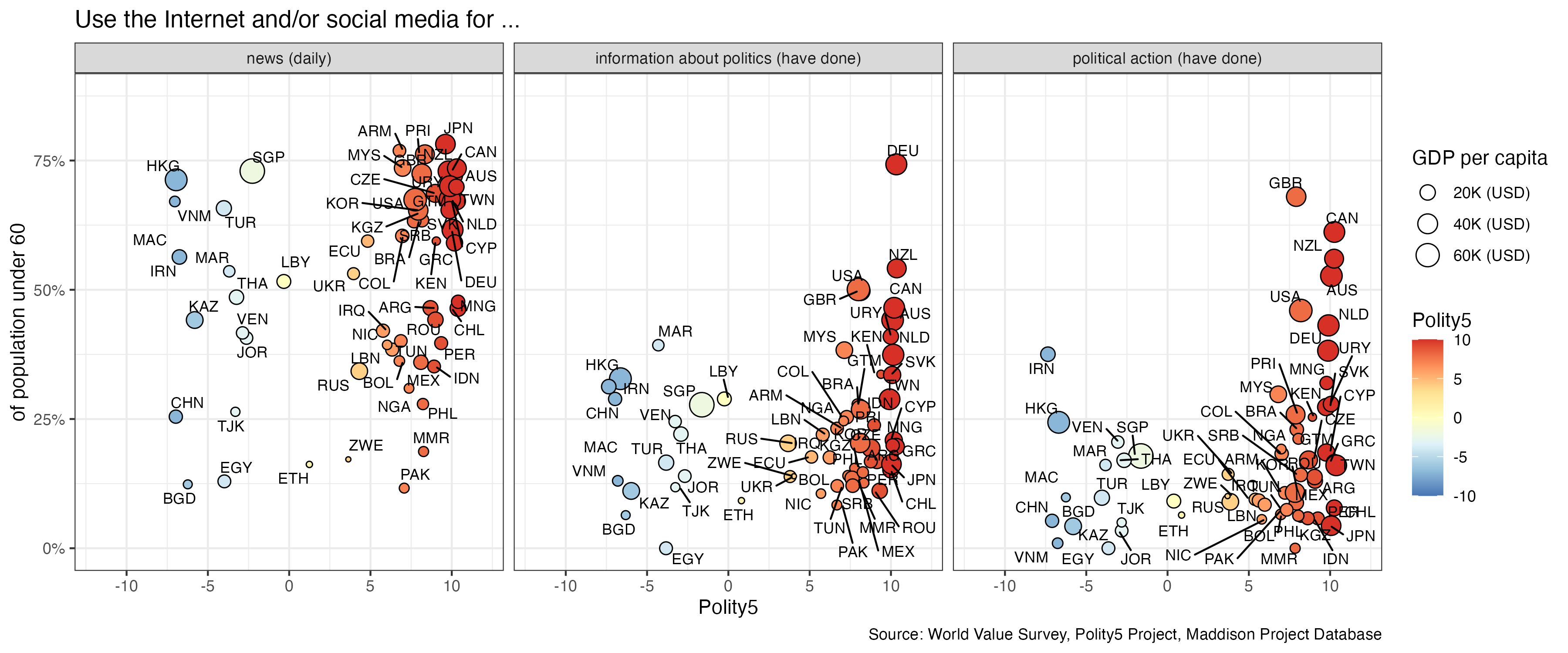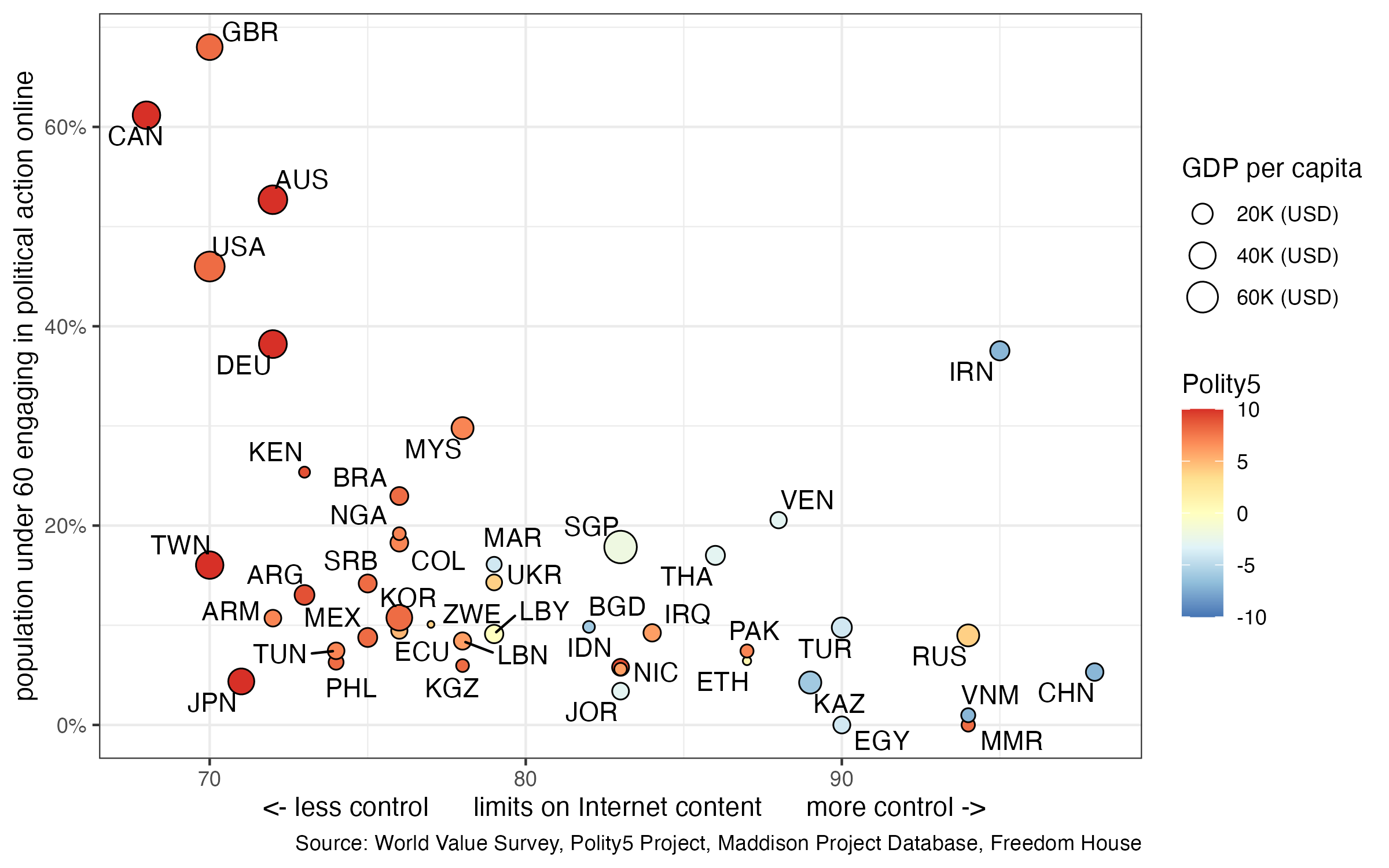
Social Media and Political Engagement in the World Today
Social media has not lived up to the democratising expectations of liberal Western states. For undemocratic countries, however, the political turbulence from uncontrolled information systems is a potential blaze that must be kept under strict control.
Two symbiotic revolutions have redefined our relationship with communication, information technologies and politics. They commenced between the end of 2006 and the beginning of 2007 and grew together in the following years. The first was the social media revolution, which began around September 2006, when Facebook opened its social media service to everyone. The second was the mobile revolution. It was defined by the massification of personal, Internet-connected devices, such as the iPhone, which was brought to the market by Apple in 2007. Today, mobile Internet devices are ubiquitous in high-income countries and connect 55 percent of the world’s population.
The use of the Internet for political action and communication predated the social media and mobile revolutions by at least ten years. In 1994, the Chiapas’ Zapatista Army of National Liberation reached a global audience in its struggle against the Mexican federal government using Internet bulletin boards. In 1999, the website of Indymedia was used by those protesting the World Trade Organization summit in Seattle to counter the mainstream media narrative. But only after 2007 did the Internet become a tool for mass political engagement. Social media and mobile devices dramatically increased the incidental and deliberate exposure to political content that was often user-generated.
Whether this has resulted in a significant increase in political engagement by people is a complex question. On one side, there is evidence of a clear correlation between social media use and political engagement: that is, social media can help promote participation by making it easier. Yet, we also observe that social media has fundamentally changed the boundaries of political participation by adding new, low-threshold actions to existing participatory repertoires (for example, introducing online signature campaigns). And whether these low-threshold activities are politically meaningful or consequential is still unclear.
Another critical question concerns social media’s overall impact on the quality of our public conversations. Keywords such as polarisation, filter bubbles, echo chambers, and misinformation have dominated headlines in recent years. Social media filtering algorithms are not designed to promote quality conversations as a public good, yet there is little evidence of a systematic negative effect. Very contextual events with deep social and political roots, such as the 2016 Brexit vote in the UK and the election of Donald Trump in America a few months later, generated a certain amount of moral panic, with social media too quickly identified as the critical cause for both.
Comparative research has questioned the causal connection between social media and political polarisation by showing that polarisation is generally low outside of the United States. Also, although social media can create bubbles through selective exposure to content, empirical evidence demonstrates that average users are connected to a diverse range of viewpoints – as the widespread diffusion of misinformation on social media during the Covid-19 pandemic implies.
So how frequently do people engage worldwide with politics on the Internet? The most recent wave of the World Value Survey, administered between 2017 and 2022 and presented in the first figure, shows that on average 61 percent of the population between 16 and 60 in high-income countries use the Internet to access news daily. Respondents in un-democratic countries such as Singapore, Vietnam, and Iran report a similar or higher frequency of use on average as German citizens. Mass access to the Internet is deemed by governments, democratic and un-democratic alike, as critical for economic development.

Yet, citizens of un-democratic countries report using the Internet less frequently to obtain political information or to engage in political discussions, as shown in the central and right panels in the first figure. As this illustrates, the presence of democratic institutions does not always translate into higher levels of online political engagement. Cultural values are also likely to play an important role – full democracies such as Japan and Taiwan, for example, reported much lower levels of engagement than the five anglosphere countries. But on the other hand, the absence of democracy always translates into relatively low levels of online political engagement.
This is because undemocratic countries are more likely to police the Internet to control the content their citizens can engage with. This is illustrated in the second figure. Not surprisingly, the severity of the limits to content imposed by a country is associated with lower levels of political engagement. The only notable exception is Iran, where Internet-mediated political engagement has played an important role in anti-government protests since the onset of the so-called Green Wave in 2009.

paradoxically, while much of the discourse in democratic countries has converged – in the absence of systematic empirical evidence and primarily based on anecdotal evidence from the US – on the opinion that social media is bad for democracy, it has been non-democratic countries that have been busy investing significant resources to keep Internet-mediated political engagement under control. This is because even if social media organisations have largely failed to meet impossibly high expectations about their democratising capacity, they have nevertheless demonstrated efficacy in increasing the degree of political turbulence, especially in mobilisating of extreme political discontent.
The social media environment comprises complex systems of multiple interacting layers. These are socio-political and infrastructural layers, mostly proprietary and controlled by private platforms. Complex systems tend to produce unpredictable outcomes (“emerging behaviours”) as their different parts interact unexpectedly. In this sense, social media does not necessarily create the underlying political conditions for some emergent socio-political behaviours; it only provides a path for it to surface – unexpectedly and quickly.
After analysing millions of Chinese social media posts, Harvard researchers found that the Chinese state’s primary goal for Internet control is not to reduce online criticism of the government but rather to prevent collective action. Can social media create ties strong enough to sustain politically significant collective action?
The Chinese government’s censorship policies suggest that they take this possibility seriously. Recent history provides anecdotal evidence that this is indeed possible. Social media has played a role in shaking party systems in Western democracies, elevating outsiders like Trump in the US or the Five Star Movement in Italy to the main stage while bypassing traditional political networks. Though isolated incidents, social media contributed to overthrowing Egypt’s regime under Hosni Mubarak, leading to a brief and tumultuous democratic experience. Various Iranian regimes have been threatened more than once.
While these events took place in different contexts, they all stemmed from high levels of discontent. Social media systems have proven adept at amplifying outrage and fear, although their role in creating such sentiments remains uncertain. The combination of social media and political discontent will continue to inject unpredictable turbulence into the political sphere across the world. Whether we like (or should promote) the outcome depends on where we stand politically.
Francesco Bailo is a Lecturer in Data Analytics in the Social Sciences at the School of Social and Political Sciences, the University of Sydney. He is interested in researching forms of political engagement and political talk on social media.
This article is published under a Creative Commons License and may be republished with attribution.
EIN Presswire does not exercise editorial control over third-party content provided, uploaded, published, or distributed by users of EIN Presswire. We are a distributor, not a publisher, of 3rd party content. Such content may contain the views, opinions, statements, offers, and other material of the respective users, suppliers, participants, or authors.

